Libraries, librarians, and the future of the web
Thank you. I’m so grateful and humbled to be here today in front of you. I attended my first and only DLF in CA in 2009 while I was at UCLA. Part of my job was working with faculty and students in supporting OA publications and our instance of the UC’s IR. So, I’ve really enjoyed catching up on what you all are working on. I am so impressed with your work and the maturation of the conversations over the years. It’s amazing for me to see the growth of this community and to be able to hear about all the exciting projects, big ideas, and important conversations happening here. It’s been a great and educational week for me.
I want to thank DLF for inviting me to speak with you all today and specifically Rachel Frick who has been a big support of some of my ideas and projects you’ll hear about today. It’s truly an honor.
We started our time here together on Monday with a great opening keynote by Bethany. She talked about how we need to zoom out and, that while expertise is important, that even experts are zooming out to place their expertise in context. At the Data & Society Research Institute where I am a fellow, I have the privilege of working with a group of those kinds of scholars and other practitioners who are experts in their area but are also zooming out, working through some tough questions and it is making all the difference. i’m going to tell you a little more about Data & Society in just a little bit.
—
[Slide]
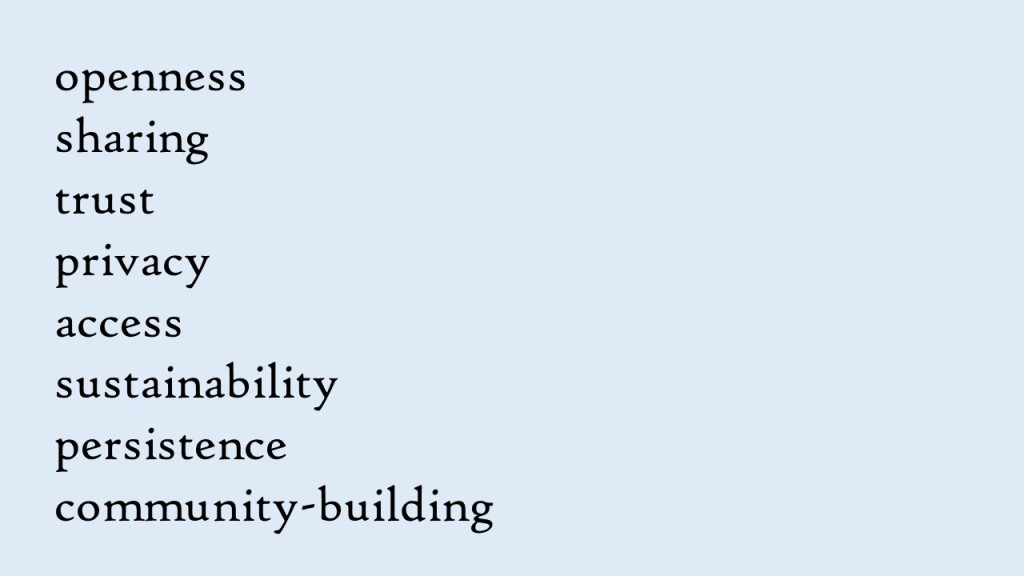
There were several themes for me from attending sessions and chatting with some of you. This week we talked about open source and open access. To me this represents openness, transparency, and sharing. We talked about rights management, the public domain, and security and privacy. As always, librarians are on a quest to open up as much access as possible and to fight for the rights of users while respecting rights holders. We saw examples of digitization and preservation projects and initiative. You are doing the hard work of capturing our past and our present for our collective tomorrow and you’re collecting an ever-growing list formats. You’re thinking about how to wrap and link this information together for even better access and use. We talked about creating trusted repositories and being seen as trusted partners and community-builders. What do these themes – openness, sharing, trust, privacy, access, sustainability, persistence, community-building – have in common? They are values of librarianship.
And, They are for the most part absent from the corporate rulers of the internet today, those who are making the web what it is. And, at the same time, they are the values that are now being sought out by many people in the tech space, the education space, in civil society, and by those who are just concerned with where we are going.
—
[slide]
Something amazing is happening.
—
[slide]
We are at the beginning of a (new) golden age of librarianship and you have the opportunity to be a part of it, to help create it actually! What an amazing place for you to be. And, how lucky for me that I get to talk to you today and to tell you that.
The golden age for libraries. That sounds like a pretty grand statement right? Well, from where I stand, a little outside your world, at the intersection of tech, civil society, and academia, it’s really not that far-fetched.
I want to tell you what I see and to make you aware of something that you might not know – and that is that a lot of people will get out of the way to make it our golden age, if we show up for it.
In my talk today, I am going to tell you a little bit about what I am doing as a Data & Society fellow, what I’ve seen and experienced over the past couple of years of meeting with, interviewing, and connecting dots with the world outside of libraries, the world that has slowly began to realize how much they want and need libraries, librarians, and the values of librarianship, many of which were talked about right here this week. I hope by the time I am done today that you leave with at least a little of the excitement I feel about our potential and I can get you believing that this future is it indeed ours for the taking.
First, I want to clarify my vocabulary. In my talk I will talk about librarians. When I talk about librarians I am not just talking about those who are degreed in the profession of librarianship. I am definitely referring to them whether they are working for a particular library or working more broadly on library issues (and I am one of those). But also, those of us who hold dear the values and the mindset of the ideals of librarianship. There are many folks out there who are changing librarianship for the better and don’t have that mls. I know there are many of you even here in the room with me right now. So when I talk about librarians, assume I am referring to you as well.
And, when I referred to libraries today I am talking broadly about libraries because often outside of our communities, people see libraries as a single thing, with a single set of principles and values and as an entity that supports their community. And yes, we parse ourselves into public, academic, school and we divide even further into our clans and yes that’s important to getting work done but there has been a growing ability, willingness and an opening that has allowed us to partner more and more with colleagues in other types of libraries, especially where there is overlapping interests and communities and I see even more partnerships possible in the future. I’ll talk a little more about partnership in a little bit.
—
[Slide]
So, it hasn’t always been a golden age for libraries. Even in the recent past. We’ve made headlines. The focus has been about libraries not being relevant, not being important in the digital age, or as huffpost like to say, libraries in crisis!
—
[Slide]
If you look at the words and actions of some of the biggest players in search and social media, you might think the values we believe in and that citizens of this country have agreed to are no longer relevant or of value. As consumers and users of popular online services, it might also look as if our complicity means we are willing to give up a lot, too. And, I think for a short time that was the case for many. It would be easy to point fingers, but as blogger, entrepreneur, and technologist Anil Dash said in a recent presentation to librarians for The Digital Shift virtual conference, even these companies didn’t expect the success they’ve had and in their excitement didn’t consider the effects of what they were building.
But, as we settle into this social, interconnected, constant surveillance of our online world as it is now, more and more people are beginning to be bothered by what we are losing and asking for what librarians know how to do.
For instance, many of us use facebook to provide us with news and updates from friends and family near and far. at the same time, we saw a lot of outrage and even death threats when people learned about the emotional contagion study published in PNAS clearly demonstrating what happens all the time on these sites – that what we see is altered for a variety of purposes.
Anil talks about a photo-sharing service which gets acquired. People get an email that says, “your photos will no longer be available either to view or edit” these users’ history was treated as ephemera. and, people were upset about that.
Mark Zuckerberg can be quoted as saying privacy is dead and that having two identities shows a lack of integrity. Yet the reality is that is just not the case. Perceptions of privacy may be changing but the value of having privacy is not gone. It’s easy for someone to say that who will financially gain from people who stop caring about their rights.
[Slide]
And, here’s a more technical example I threw in bc you would be the kind of librarians that would appreciate this. for a long time google results used to just be what we see on the left – an algorithmic answer to your search query. but people required more context, more linkages and more intellectual connections, so google added what you see on the right.
[Slide]
Google acquired this ability by buying a company called metaweb who developed Freebase, “open, shared database of the world’s knowledge” according to wikipedia.
Freebase is an online collection of structured data harvested from many sources.
So, what this is telling me is that maybe people are wanting a bit of their humanity back, a bit of their values back, a bit of their rights back, a bit of their structure back. Policies, ethics, and corporate accountability that fit with the values that I talked about earlier. The values that you talk about here at dlf and in libraries more broadly.
[Slide]
It’s not a coincidence that there is a lot of overlap in the values people are calling for on the web. Something is changing.
Let me tell you a little bit about what I’ve been up to the past couple years and maybe that will help you see what I see.
—
[Slide]
Three years ago I attended SXSW Interactive. Do folks here know what that is? It’s a conference/festival focused on emerging technology, according to wikipedia, it has earned the reputation as a breeding ground for new ideas and creative technologies. I took personal time from work and went bc it sounded cool and I like technology and ideas and being around people who like that stuff, too. There I experienced something i didn’t expect and could not have anticipated. As I sat in sessions listening to talk after talk and idea after idea, I thought to myself, librarians need to be here, librarians need to be hearing what they are talking about. or a librarian should have been on that panel bc this is what we do or this is what we care about.
Sessions covered topics like the sharing economy, the future of publishing, participatory media, the digital divide, serendipity and discovery, copyright, privacy, and intellectual property.
—
[Slide]
So I did what I knew how to do – bring the library community with me the following year. I rented a house, i named it the Idea Drop Library House (meaning it’s a place for people to go bring back ideas they learned at the conference and drop them off, share them, then go back out in bring back more ideas).
[Slide]
Afterwards, we’d figure out what to do next. The idea picked up some steam and grew so that by the time SXSW rolled around again we were inviting some of the hottest speakers from one of the hottest conference to come to the house and talk about what they were presenting on at sxsw in small, salon-style conversations with a camera which live-streamed the content out to the library community broadly. I’d like to note that DLF funded that live stream and Rachel Frick’s support and enthusiasm helped make this happen. So, thank you to Rachel and DLF for that. I had two goals with this:
1. I wanted librarians to learn from the collection of cool people who come to sxsw. This is where the future of the internet was being born and it is within that world that all of us must live and work and consider the future of our profession.
2. I wanted academics, the tech community, and beyond to think, yeah, of course, librarians should be here. This is about information and librarians are information people so it makes sense that they are here.
And it was magnificent. it was one of those amazing moments where i was living a moment exactly how i imagined it in my head.
[Slide]
here in our little living room about 2 miles away fro the convention center, we had, for instance, Henry Jenkins (American media scholar and currently a Provost Professor of Communication, Journalism, and Cinematic Arts, at USC), the day after he was a featured speaker in a room with over 5k people +. Here’s a picture of that interview where and his co-author Sam Ford talked about their new book Spreadable Media.
[Slide]
These casual pictures of us sitting out back on our porch with beer are in here on purpose. As the festival went on, the more people wanted to just hang out with a smaller group of like-minded folks instead of dealing with the lines, the warm beer and cold tacos. This is where great conversations and connections could happen.
[Slide]
I met someone in NYC who told me he was told to go the library house and that it was equivalent to having a camp everyone was talking about at burning man. I don’t know, I guess that was a compliment.
—
[Slide]
I mentioned we were two miles away and thank goodness we were because this guy, Alistair Croll, tweeted he was going to hang out with librarians, Tim O’Reilly retweeted it and soon a lot of people messaged Alistair for the address. This meant panic for us since technically we weren’t allowed to have more than 15 people in the house at any given time. Being two miles away stopped most of the crowd luckily.
—
[Slide]
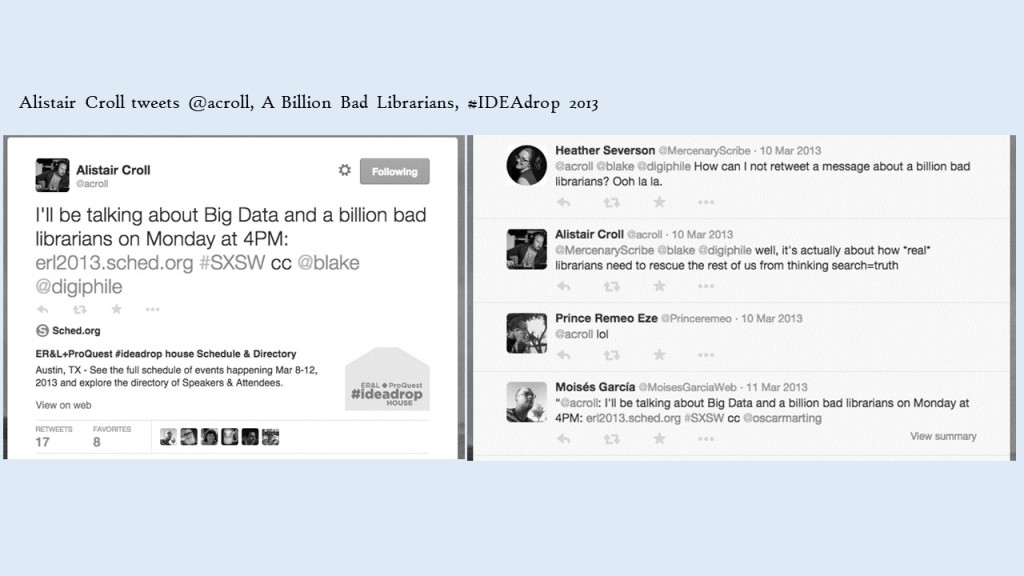
Here’s Alistair’s tweet and some responses to make such a statement. He is looking for real librarians to help.
—
[Slide]
Alistair had several concerns about the future of technology and the missing piece that could best be described as time-tested wisdom and values around what it means to management information, to catalog it, to make it accessible, make it useable, and to consider the longer term implications of how information can be used. You see, he was asking the “good librarians” to help him because the “billion bad librarians” were taking over the internet.
This is the first of a few pleas i’ve heard from the tech community, the part with a conscious (which I believe is a big part), the part that is reflecting on what was the recent past and what is the current situation and what some possible futures might look like.
On Alistair’s request, I came to NYC to present at the Strata Conference, an O’Reilly conference bringing together tech, academia and business around topics in big data. There I said: librarians not only have the information management skills but they have the values and wisdom to know what it means to lock down information, and the impact of taking away someone’s right to be an informed citizen. They know what happens when information can get in the wrong hands and libraries have worked for decades to protect citizens so they can learn, question and grow because we know that is necessary for a truly informed democracy.
—
[Slide]
Then, we had another great year with another great set of speakers. We had representatives from ALA talking privacy and info policy around the Internet Of Things, we had folks from LGBT Tech, and a bright young woman with a new app that connections knowledge experts who are physically near you to you if you have a question they can answer or want to pick their brain over coffee. What an interesting way to help people learn from their peers or experts on a campus or at a museum or nearby coffee shop!
—
[Slide]
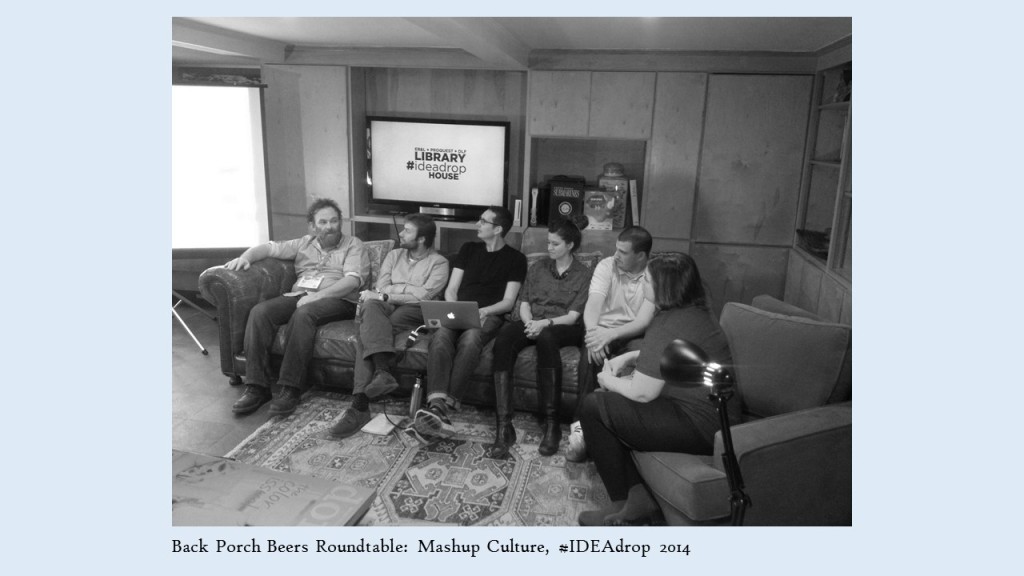
One of my favorite talks was this one, Back Porch Beer Roundtable: Culture Mash-Up. It was a huge group from all over the world and from different viewpoints to talk about the use and reuse of cultural heritage materials. Folks represents SFMOMA, PBS, The Edge, History Pin, Findery, and also an entertainment lawyer. They talked a lot about how copyright impacts their work and their projects (so they end up thinking less about the best content for their audiences and more about the content they can use or can afford. They also covered digital preservation of popular site we use all the time and what happens if, like geocities websites, fb were to be sold or shut down. It would be rare to get this particular group of people from all over the world to be in the same place at the same time to have this kind of conversation and that was really, really exciting.
—
[Slide]
I mentioned the Alistair Croll made a plea to librarians in 2013. and, just a few weeks ago, I heard another plea to libraries. This time from Anil Dash, who is also on the Data & Society board of advisors. Again, he was talking at the The Digital Shift, LJ’s virtual conference. During that talk, he says that we (especially those who are building the web) have strayed from the values of the internet being a public good. He proclaimed that those who made the social web failed. he is asking for librarians to partner with tech to build the web the way it was supposed to be intended – the public web.
—
[Slide]
something amazing is happening here…
—
[Slide]
The fact that I believe it is our time is why I chose to submit a proposal and accept a fellowship at the Data & Society research institute.
Data & Society is a brand new think/do tank focused on social, cultural, and ethical issues arising from living in a data-centric, networked world. It is the creation of danah boyd (a brilliant individual (social media scholar, youth researcher, and advocate working at Microsoft Research, New York University Media Culture & Communication and the Harvard Berkman Center for Internet & Society). I’ve followed danah’s work my entire professional career and it’s been a real treat to work with her.
She had a vision to work through some of the tough questions and issues but also great things that are now possible because we are living in a world of vast amounts of data and at the same time we have the tools and skills to do a lot with the data.
Here we are close to the beginning of this data explosion and it just makes sense that a librarian should be at the table. It’s where we should be at any technological explosion that is about use of information and/or where it impacts our communities.
[Slide]
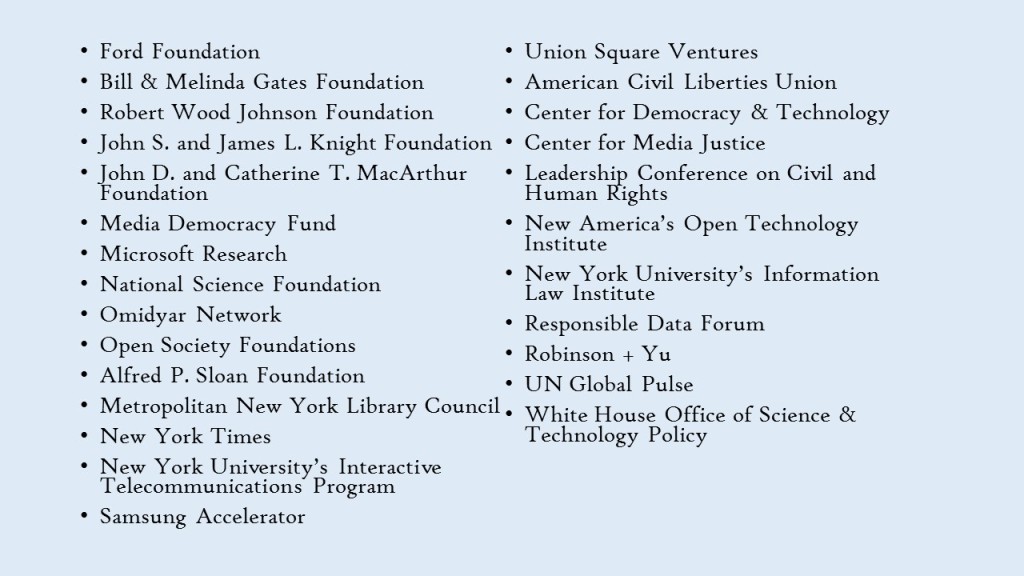
Initial funding came from Microsoft but at this point most fellows and other programs are funded by other organizations. Just to get a sense of the variety of organization who have supported Data & Society in some way just in its first year of existence, here’s a slide.
[Slide]
My focus at this point:
- Look at trust and privacy in the digital age. As perceptions of privacy are adjusting amongst the general public, and since privacy is a core value of librarianship, does our view or understanding or actions regarding privacy adjust in our current times. And, at the time, how can libraries leverage the public’s sense of trust in libraries to help support the privacy and security rights of the citizens we support? but, this is not a privacy talk to I will leave all of that aside for now. i am keeping my fingers crossed that a big partnership of organizations get the grant we proposed to bring more data privacy and surveillance professional development to librarians.
- Consider how libraries can grow citizen scientists so they can ask questions of data being collected about them and/or local government data. Essentially, growing the idea of data exploration beyond those who have both the right questions AND the right data analysis skills.
- And lastly, I want to see where else libraries or our lib organizations can be a solution to the new problems of our current times.
I’ve been a fellow since July but I ‘ve been living in NYC for less than two months and From the informal conversations i’ve had with folks around NYC, there is so much potential for librarians to play a part in this developing area.
Themes that are present in these conversations are around libraries as the central place in their community for learning, for sharing, for knowledge building and knowledge creation.
Libraries already manage a lot of big and small data. they know how this stuff works. How can we leverage this to support a broader community?
Libraries are seen as trusted organizations so they may be able to support new projects that require partnerships between tech corporations and non-profits in data sharing.
And i want to engage you more and talk about my ideas and my conversations. I’ve been getting oriented and just absorbing as much as i can but follow me on twitter and you’ll start to see more writings from me on all this good stuff.
[Slide]
Fellows represent those from the nonprofit world, from giant corporations, from academia, and civil society.
[Slide ]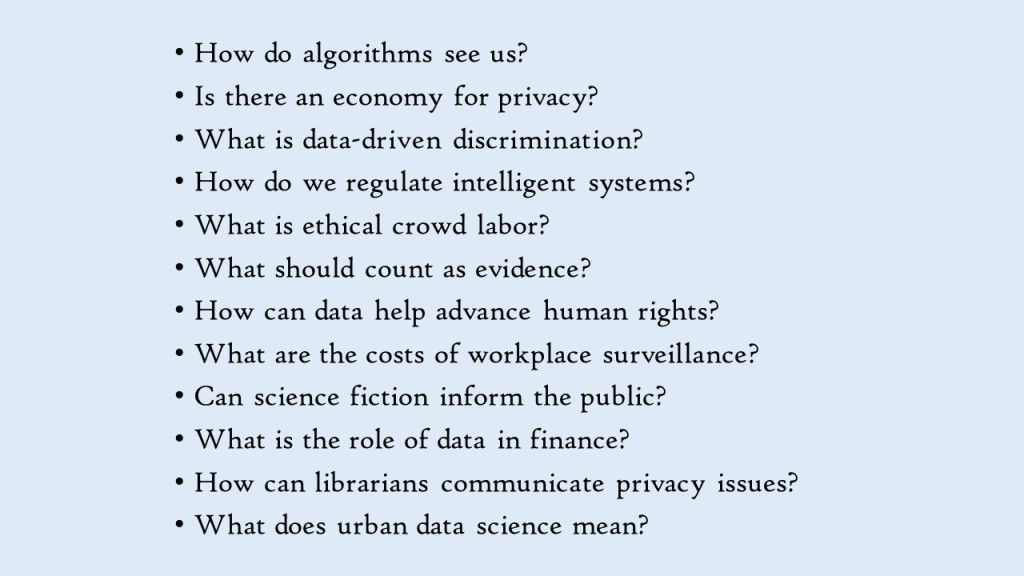
Here is a list of some of the questions we are asking during our fellowship. as you can see, there is a huge range we are each exploring, yet there are a number of overlaps if we zoom out far enough.
We meet weekly and bring in folks to engage in debate and discussion. To give you a sense of who we meet with recently we had Chris Wiggins, Chief data scientist at the NYTimes and a prof at columbia. we’ve had UN global pulse, An innovation initiative of the United Nations harnessing big data for sustainable development and humanitarian action. Jeff Hancock, the professor from Cornell who performed and published on the emotional contagion facebook study, we had claudia perlich, chief scientist from distillery (a major online marketing company) who explained technically how our browser data translates into the ads that we see when perusing the internet. We’ve had a librarian, an artist, activists. Once we move into our permanent space we will be inviting a bigger audience and we will be recording many of these discussions so a broader set of people participate.
[Slide]
D&S is more than just a fellows program. we have a number of groups who are partnered with other organization or funded by various foundations.
[Slide]
Check out our homepage. we have a lot of outputs that may be of interest to you and you can join our email list.
—
[Slide]
I hope you’re starting to see something amazing is happening
—
[Slide]
Even foundations and think tanks are interested now more than ever in reporting on funding “libraries as solutions”.
Aspen – focuses on initiatives to create a better society and they recently concluded a report on the future of public libraries in america and will soon discuss actions that will be taken to work towards their findings.
The Aspen Institute Dialogue on Public Libraries is a multi-stakeholder forum to explore and champion new thinking on U.S. public libraries, with the goal of fostering concrete actions to support and transform public libraries for a more diverse, mobile and connected society.
—
[Slide]
And, The Knight Foundation News Challenge focused on libraries is so exciting. They asked of the library community, “how might we leverage libraries as platform to build more knowledgeable communities?”
There were over 600 proposals. Many were really exciting and represented a diversity of people and projects. It was great to see individual voices and groups thinking differently about how to support their communities. Some themes from topics that made the top 41 include: new partnerships, training for librarians and community members in data analysis, digital privacy literacy, teaching librarians about privacy laws and tech tools, perserving born-digital news, digitization projects to preserve cultural heritage, open data
—
[Slide]
And now, the headlines are starting to change as people outside of libraries start to consider a different future for libraries and as librarians are partnering with like-minded activists and organizations or being tapped to write articles for main stream and tech publications.
—
[Slide]
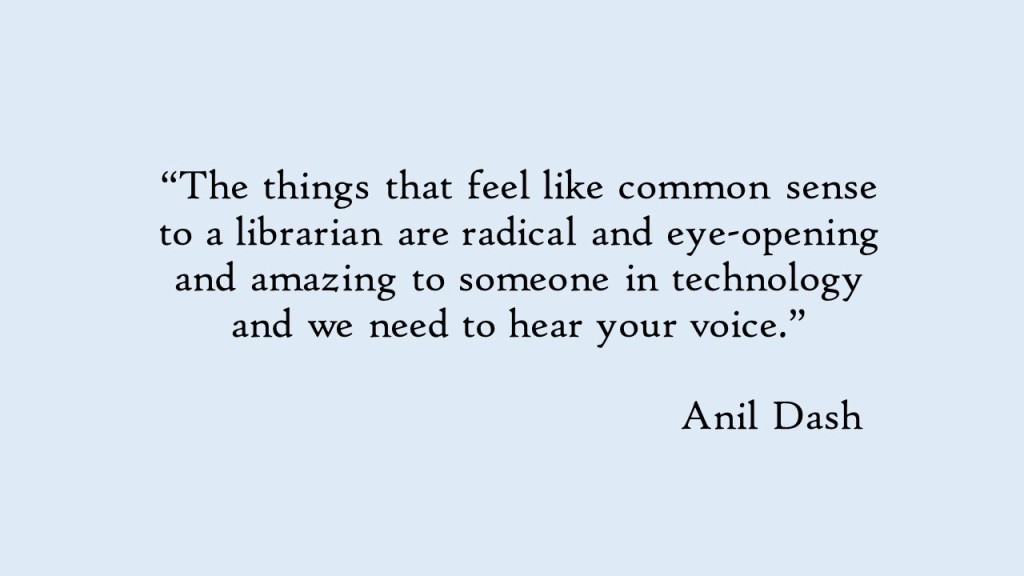
So, you may be asking what does this actually mean for me when I go back to my library. I don’t have the path forward laid out bc we need to make it together. I do think there’s a few things we can think about as we leave here today:
- Think more broadly about partners. It may be easier to partner with the same players where you have relationships and you think similarly, but more important is what you hope to get out of the partnership. maybe a partnership with the public library in your community or the campus student group running hackathons, companies with a similar goal
- When starting new initiatives, think about the values that are being communicated by being connected to that project. Think about how you will ensure those values. As bethany talked about in her opening, zoom it out a bit and see how it fits with where we are going.
- To those in leadership in libraries, support or get out of the way of your creators, those with energy and ideas, idealism, and a fresh perspective. we need them very much and it saddens me how many wonderful new colleagues leave libraries or, worse, leave librarianship completely, because of organizational problems.
- And for the dreamers, the creators, remember that you have the power to build the future of librarianship and quite possibly the future of the web as we know it with every little thing you create that didn’t exist before.
This is your golden age for the taking. We can keep doing what we’re doing in libraries (and there’s a lot we should keep doing) or we can seize this time. We can do many things as individuals and I encourage those creators and visionaries to keep doing that. But, I do honestly believe that what is required is a collective decision to thrust ourselves into the places we need to be, the places where we have been asked to be, and the places where we are an unexpected and necessary guest.
This could be our golden age. I ask of you. Think big, make meaningful partnerships, be where you are needed not where you may be comfortably residing, hold tight to our values, and keep doing the kick-ass work you do.
Thank you!
